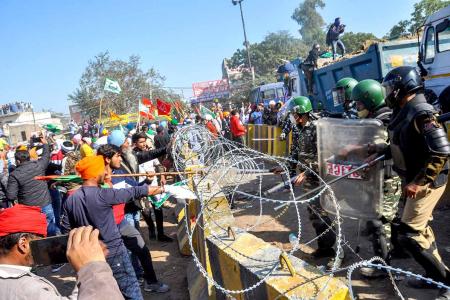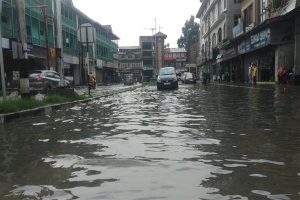
Beyond Barricades and Bureaucracy: Navigating the Passport Revocation Debate Amid Farmer Protests
New Delhi: In the heart of India’s recent farmer protests lies an unexpected twist—a brewing storm over the revocation of passports. This article unravels the intricate layers surrounding the Haryana Police’s threat to cancel passports of farmers allegedly involved in protest-related activities. Beyond legalities, it explores the potential consequences, the human cost of such a measure, and suggests possible solutions at this crossroads of law, rights, and livelihoods.
Understanding the Legal Landscape:
The Passport Act of 1967 acts as the legal compass guiding passport issuance, revocation, and impounding in India. Sections 10A and 10B provide authorities with the power to revoke passports for reasons tied to national security, public interest, and diplomatic relations. However, the law incorporates safeguards to prevent arbitrary actions:
- National Security Concerns: While national security concerns warrant passport revocation, mere participation in peaceful protests may not meet this threshold unless linked to unlawful or subversive activities.
- Criminal Offenses: Revocation can occur if an individual is accused of serious crimes. Yet, the severity of offenses during protests might not necessarily warrant passport cancellation.
- Misuse of Passport: Fraudulent acquisition or using a passport for illegal activities can lead to revocation, but proving misuse requires a thorough investigation.
The legal process ensures due diligence, investigation, notice, and a fair hearing before authorities take any decisive action.
Safeguards Against Arbitrary Revocation:
The legal framework is bolstered by safeguards:
- Investigation and Evidence Gathering: Authorities must conduct a thorough investigation, ensuring decisions are fact-based.
- Notice and Hearing: Individuals facing revocation must receive adequate notice and an opportunity to present their defense, upholding the principle of natural justice.
- Judicial Review: An individual can seek judicial review if they disagree with the revocation decision, ensuring independent scrutiny.
- Appeal Process: The Passport Act provides an appeal process, allowing individuals to challenge revocation decisions.
Examining the Human Cost:
The threat of passport revocation raises concerns about its potential human cost:
- Impact on Livelihoods: Many farmers engage in international trade of agricultural products, and revoking passports could disrupt their livelihoods.
- Educational Opportunities: Restrictions on travel might hinder educational opportunities for farmers’ children or aspiring agricultural professionals.
- Family Reunions: Farmers with families abroad could face challenges visiting or migrating due to revoked passports.
Besides economic and social implications, revoking passports potentially infringes on the fundamental right to freedom of movement, protected by Article 19 of the Indian Constitution.
Farmer Protests Through the Legal Lens:
Colin Gonsalves notes that being part of a protest, even with the potential for trespassing charges, does not inherently pose a danger to the state. This raises questions about the balance between maintaining public order and safeguarding fundamental rights.
Conclusion: A Crossroads of Law, Rights, and Livelihoods:
The farmer protests’ intersection with passport revocation unfolds as a complex situation. While authorities possess the legal authority, careful consideration is required due to potential infringements on fundamental rights and the associated human cost.
Possible Solutions and a Way Forward:
- De-Escalation and Dialogue: Open and constructive dialogue between farmers and authorities offers a sustainable solution, addressing core concerns and potential policy revisions.
- Due Process and Transparency: Any decisions regarding passport revocation should adhere strictly to the established legal framework, ensuring thorough investigations and transparency.
- Upholding Fundamental Rights: Maintaining public order is important but not at the cost of compromising fundamental freedoms unless compelling reasons exist, and due process is followed.
- Alternative Solutions: Exploring alternatives, such as deploying additional security personnel or establishing designated protest areas, might prove more effective in maintaining order.
A Call for Empathy and Understanding: The ongoing saga surrounding farmer protests and potential passport revocation emphasizes the need for empathy and understanding. Constructive dialogue, upholding fundamental rights, and recognizing the challenges faced by farmers are critical steps toward a fair and effective resolution. This approach aims to create a society where individual rights are protected, legitimate concerns are addressed, and disagreements are peacefully resolved.
More Stories
Priyanka Gandhi Vadra Criticizes Centre: Voices Concerns Over Farm Laws, Article 370 Repeal
Congress general secretary Priyanka Gandhi Vadra claimed the Centre was forced to repeal farm laws due to incoming elections. Congress...
Travel Advisory: India Urges Caution, Recommends Against Visits to Iran, Israel Amid Rising Middle East Tensions
Iran blamed Israel for the strike on its consulate in Syria 11 days ago and there have been fears that...
India Abstains as UN Body Adopts Motion Condemning Israel for Possible War Crimes
Japan and the Netherlands were among the 13 countries that abstained when the resolution presented by Pakistan on behalf of...
Shiv Sena Workers Torch Photo of Omar Abdullah Amid Maharashtra Bhavan Remark
Activists of Eknath Shinde-led Shiv Sena on Sunday burnt a picture of Jammu and Kashmir National Conference leader Omar Abdullah...
BJP’s Fifth List Unveils Surprises: 37 MPs Dropped, Actors and Former Congress Figures Enter Fray, Arun Govil and Kangana Ranaut Among Nominees
Lok Sabha elections: The BJP has also dropped some sitting ministers. Varun Gandhi has also been axed from Pilibhit. New...
Landmark Decision: Preventive Detention Declared Illegal in India
The Supreme Court has declared preventive detention as a black law. Live Law reported that in a significant ruling, the...

